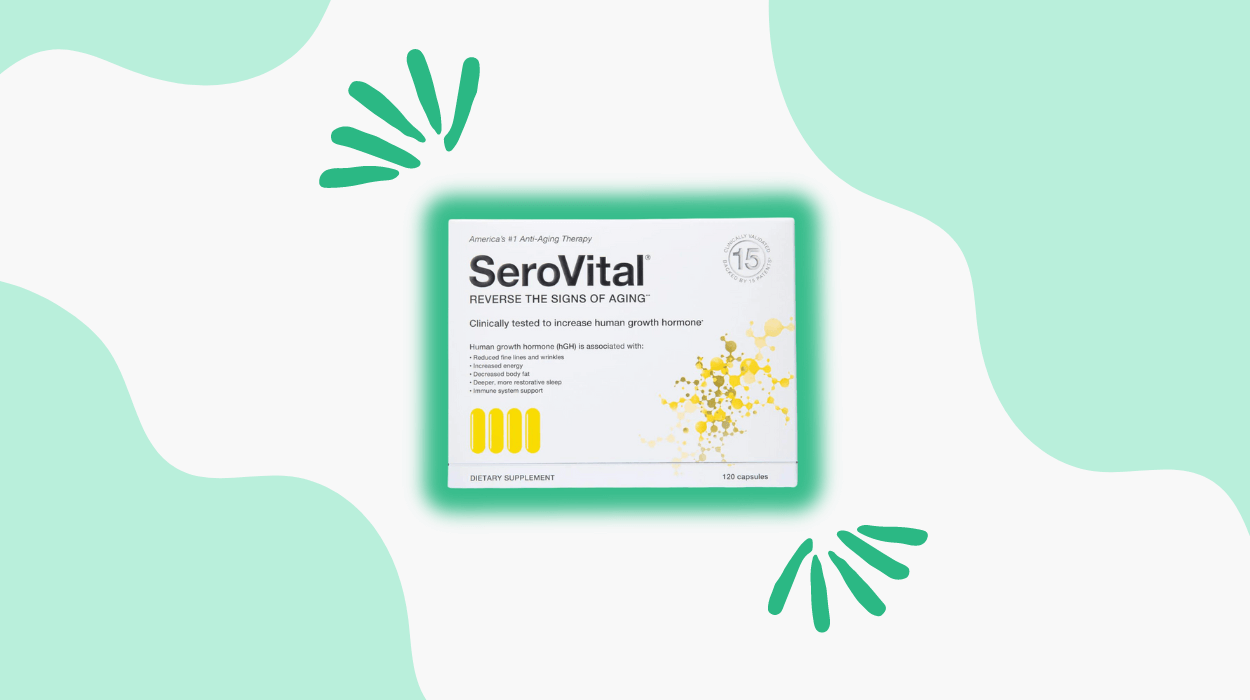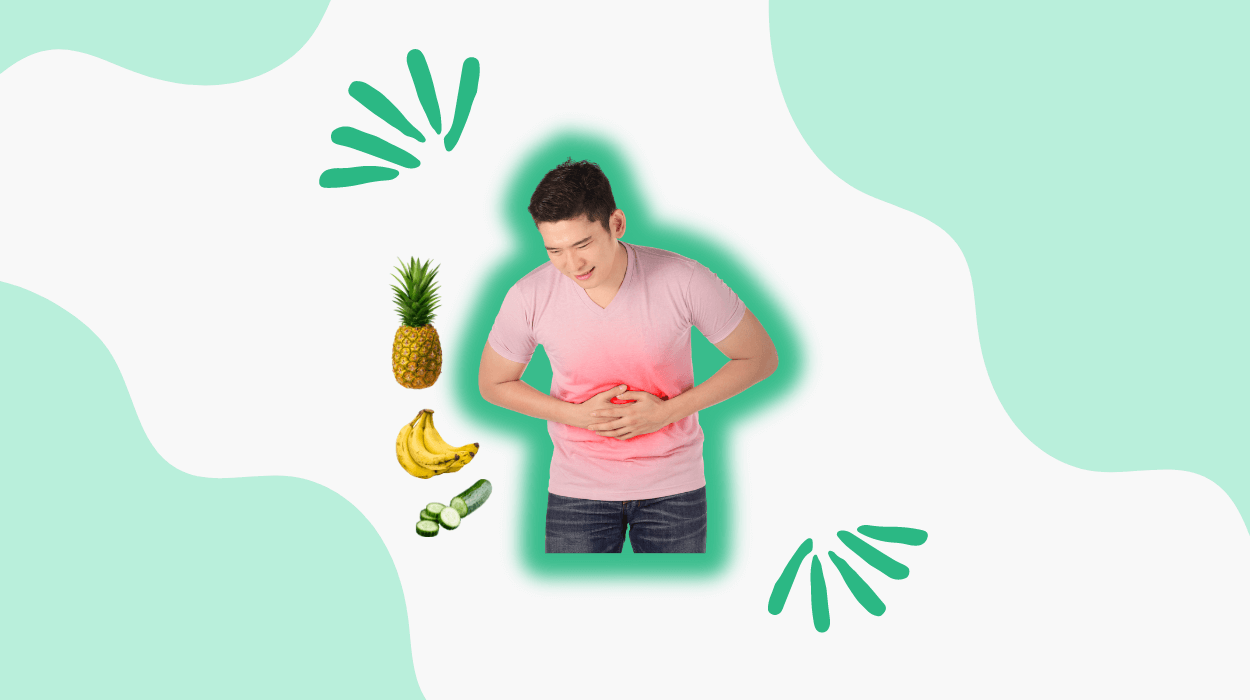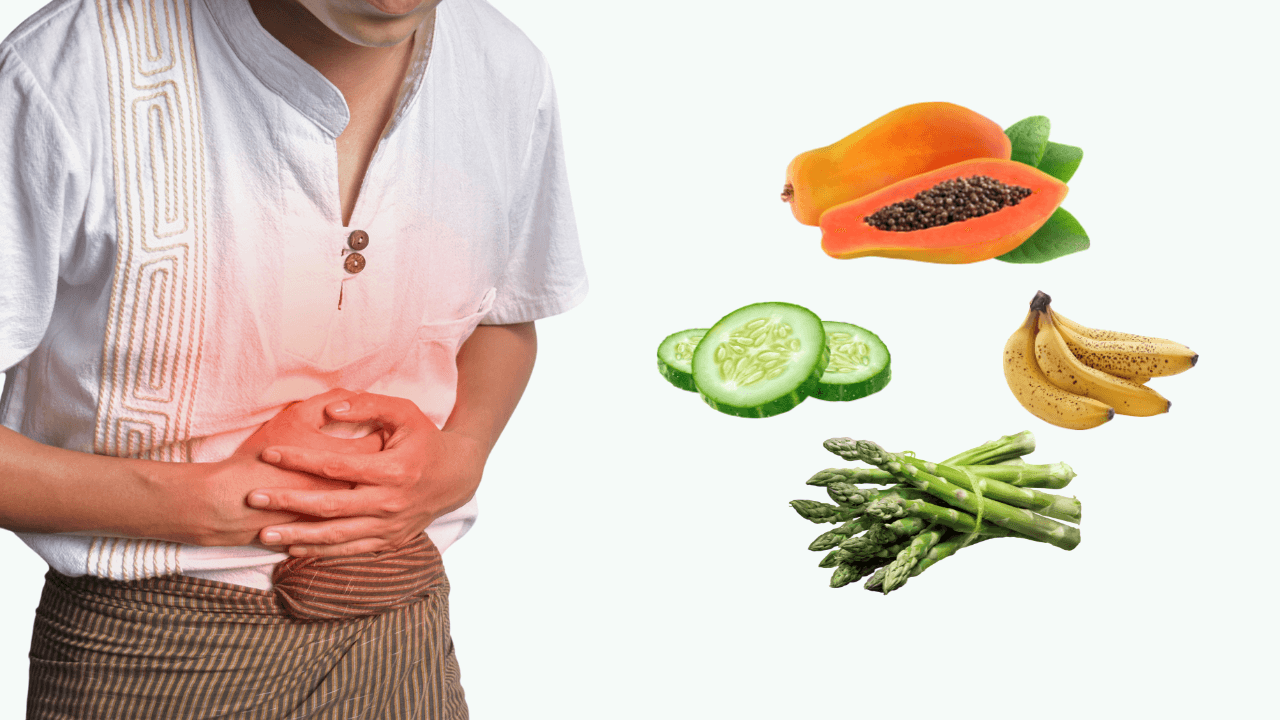

Bloating is marked by excessive gas or water buildup in your abdomen, which may stem from excess air swallowing or poor digestion. It could inflame your gut, leading to potential discomfort, pain, or swelling.
What you might not know is that certain foods like beans, lentils, or broccoli may trigger digestive issues, including bloating. These foods may cause excess gas buildup in the digestive tract, particularly for people with sensitivities or food intolerances.
This article lists 19 foods that may reduce trapped gas in the digestive tract, potentially relieving bloating discomfort. The article will also explore some additional measures that could help reduce bloating.

Cucumbers contain quercetin, a flavonoid antioxidant that could potentially reduce bloating and gut inflammation. It may help restrict the activity of pro-inflammatory enzymes, which may lead to inflammation and bloating in the stomach.
Adding cucumbers to your diet may be a simple and effective way to combat bloating. Whether sliced and enjoyed as a snack, added to salads, or infused in water, cucumbers offer a refreshing and hydrating option to support digestive health.
Cucumbers are low in calories and high in water content, making them suitable for those looking to manage their weight while reducing bloating. Swapping sugary drinks for cucumber water may help you stay hydrated and provide anti-inflammatory benefits.
Asparagus has a high water content and prebiotic properties. It contains about 93.2 grams of water per 100-gram serving, helping improve overall hydration levels.
The diuretic effect of asparagus might reduce water retention, alleviating bloating symptoms. Its high water content could also promote urination to flush out excess water that may cause discomfort and bloating.
Prebiotics in asparagus may support the growth of beneficial bacteria in the gut. It may help maintain a healthy balance in the digestive system, which might prevent the accumulation of gas that leads to bloating.
You could easily add asparagus into salads or stir-fries or enjoy it as a side dish, making it a convenient option for supporting digestive health and reducing bloating.
Rice could be a non-gassy starch option that might help reduce bloating. It may complement a healthy diet and help you add starch to your meals without the risk of feeling gassy.
It is usually gentle on the digestive system and may provide a source of energy and essential nutrients. Consuming rice could be less rough on your gut and may not trigger bloating or gas.
One medium banana of 126 grams contains 451 mg of potassium. Potassium-rich foods like bananas might help control sodium levels in the body, thus preventing water retention and reducing salt-induced bloating.
Bananas are also a good source of fiber, which could help relieve or prevent constipation, a common issue that may contribute to bloating. The high fiber content of bananas may help support healthy digestion.
Papaya contains the papain enzyme, which may help break down proteins, making it easier for the body to absorb essential nutrients. The anti-inflammatory properties of papaya could help reduce digestive discomfort and bloating. The fibers present in papaya may contribute to promoting a healthy gut environment. They could help support smoother digestion and overall gastrointestinal health.
Bromelain, an enzyme present in pineapples, could support healthy digestion. Research shows that bromelain may help break down proteins (including collagen), which might support better digestive function and reduce bloating.
Pineapple has a high water content of 86 g in a 100-gram serving. It also comprises essential nutrients like vitamin C, manganese, and antioxidants, which contribute to overall health and well-being.
The high water content in pineapples could help keep the body hydrated, improving digestion and reducing the likelihood of bloating.
Consuming yogurt with probiotics may introduce beneficial bacteria into your gut. These good bacteria may help break down food, absorb nutrients, and maintain a balanced gut microbiome.
Probiotics in yogurt may offer other health benefits, including boosting immune function, reducing inflammation, and even supporting cognitive health. These live cultures might help prevent bloating, gas, or other digestive issues by optimizing gut bacteria balance.
You should choose yogurt varieties that contain active cultures and refrain from those with added sugars or artificial ingredients. You may enjoy yogurt plain or mix it with toppings like honey, jam, or granola for added flavor.
Fennel seeds could help relax gastrointestinal spasms, support the passage of gas, and provide relief from bloating. It might help soothe the digestive tract, making it easier for gas to move through and reduce discomfort.
They have antioxidants and anti-inflammatory effects that could support gastrointestinal health. The calming effect of fennel seeds on the digestive system might reduce indigestion and support overall wellness.
One way to include fennel seeds into your routine is by chewing on them directly after a meal. You could opt for fennel tea, which might also offer relief from bloating and improve digestion.
Ginger contains the digestive enzyme zingibain, which may break down and metabolize proteins for improved digestion. The compound may potentially increase the efficiency of food digestion, reducing bloating, constipation, and gas.
Studies indicate that ginger possesses anti-inflammatory and antioxidant properties, which may contribute to overall digestive comfort and well-being. It might help prevent and remove excess gas in the intestines, possibly reducing bloating.
If you are already feeling bloated, try preparing and drinking homemade ginger tea to soothe digestive discomforts. Simply steep some slices of ginger in a cup of hot water for five to ten minutes, let it cool a bit, and drink the mixture.
Peppermint tea contains menthol, which has an antispasmodic effect on the digestive tract muscles, helping reduce bloating and gas. Chamomile tea has anti-inflammatory effects that may soothe the gut and reduce bloating discomfort.
Research suggests that chamomile tea has calming effects that might promote relaxation and reduce stress, which may contribute to bloating. It has a gentle cleansing action on the stomach, helping minimize digestive discomforts.
Cinnamon has a rich antioxidant content that may help get rid of excess gas in the digestive system. It contains anti-inflammatory compounds that might potentially reduce bloating and support digestive health.
The antioxidants in cinnamon might help eliminate free radicals and reduce inflammation in the gut, potentially easing bloating symptoms. Cinnamon might help tackle various digestive issues, including bloating, constipation, and gas.
Oranges have a high fiber and water content, offering potential benefits for reducing water retention and supporting regular bowel movements.
The fiber in oranges could maintain bowel regularity by adding bulk to the stool and encouraging healthy digestion. The water content in oranges helps hydrate the body, preventing constipation and bloating that may result from dehydration.
Rich in vitamin C, oranges may support gut health. Vitamin C, a potent antioxidant, could increase the beneficial gut bacteria count. A healthy gut microbiome could ensure optimal digestion and might help reduce bloating and discomfort.
Whether consumed whole, juiced, or added to salads, oranges provide a convenient and delicious way to increase fiber intake and promote digestive health.
However, people sensitive to citrus fruits or those having acid reflux issues should monitor for any adverse effect of oranges on their digestive system.
Berries have fiber and antioxidant properties that offer digestive health support. With 4.3 grams of fiber per 100-gram serving, berries may promote regular bowel movements and improve digestion.
The fiber in berries may prevent constipation by adding bulk to your stool and stimulating the growth of beneficial gut bacteria. These processes may help maintain a healthy digestive system.
Antioxidants in berries may help reduce gut inflammation and protect against digestive disorders. These antioxidants may combat harmful free radicals and reduce oxidative stress in the digestive tract.
The high water content in berries may also promote hydration, which could maintain healthy digestion and prevent constipation.
Tomatoes are a good source of prebiotics, which are nondigestible components that support the growth of beneficial gut bacteria. Eating tomatoes may particularly benefit people with digestive conditions like Crohn’s disease or malabsorption.
Prebiotics found in tomatoes could help maintain a healthy gut microbiota. A balanced gut microbiome might help reduce bloating, improve digestion, and enhance nutrient absorption.
Lentils are a legume rich in fiber and resistant starches. The high fiber content in lentils may support regular bowel movements and help prevent constipation, a common cause of bloating.
Here is a breakdown of the major nutritional components found in a 100-gram serving of lentils:
| Nutrient | Amount per 100g serving |
|---|---|
| Fiber | 7.9 grams |
| Protein | 9.02 grams |
| Iron | 3.3 milligrams |
| Folate | 181 micrograms |
| Potassium | 369 milligrams |
The resistant starches in lentils serve as prebiotics, triggering the growth of beneficial bacteria in the gut. Such processes are essential in supporting overall digestive health.
Broccoli is rich in dietary fiber, with a 100-gram serving of broccoli providing 2.4 g of fiber and 90 g of water. It may help optimize digestive tract function, which might prevent constipation and reduce gas buildup that may lead to bloating.
It contains a compound called sulforaphane, which could help support the body’s natural detoxification processes. Such effects might help reduce digestive discomfort and bloating.
Some studies suggest that broccoli may support the production of digestive enzymes, which might improve the digestion of food and mitigate gas and bloating.
Apples contain fructose, which some people find hard to digest. Fructose is a FODMAP and is fermented in the large intestine, potentially triggering bloating and gas. Apples also contain sorbitol, a natural sugar that might trigger gas and bloating if not properly absorbed by the body. If you find that apples cause bloating, you might try eating half an apple at a time and chewing it slowly to help break down the fructose before it reaches your digestive system.
Pears contain fructose and sorbitol, which could cause bloating and gas in some people if not properly absorbed. They also contain pectin-soluble fiber that could trigger bloating. The stomach may not be able to digest peers well, which could make it feel heavy on the stomach and also increase the time it requires to break it down for digestion.
Watermelon is high in fructose, a natural sugar that could be tough on the gastrointestinal system because it’s hard for it to be completely absorbed. It may be hard on your GI to break down watermelon, which might induce digestive discomfort due to its high FODMAP(fermentable oligosaccharides, disaccharides, monosaccharides, and polyols) content while also potentially increasing your overall sugar intake.
Implementing lifestyle habits like avoiding talking while eating or drinking might help reduce gas-induced bloating. You could also take the following steps to reduce the risk of bloating:
When empty, your stomach is roughly the size of a clenched fist. Consuming gaseous foods, swallowing excess air, or certain digestive disorders may cause excess gas buildup, contributing to bloating and digestive discomfort.
Overeating may put stress on your stomach and interfere with digestion. Foods high in soluble fiber and carbs like peas, barley, or beans are more likely to ferment in the gut and cause bloating.
Consume fermented foods like kefir, animal proteins, oats, and leafy greens like spinach to reduce bloating and excess gas buildup. Eating fruits like oranges, papaya, bananas, or pineapple might also help minimize bloating.
Tyler Read earned an undergraduate academic degree from Sonoma State University, California and is a certified personal trainer (CPT) with NASM (National Academy of Sports Medicine). With over 16 years of experience, Tyler has trained clients both online and in-person.
He is passionate about helping others turn their love for fitness into a career. Tyler has worked with many local and commercial gyms before establishing his successful private personal training business, which he continues to operate.
